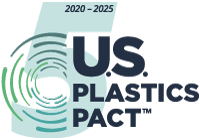Walpole NH, (October 7, 2022) – The ten reuse/refill finalists have certainly made it hard for the U.S. Plastics Pact’s Sustainable Packaging Innovation Award judges to select a winner. The U.S. Plastics Pact Sustainable Packaging Innovation Award was initiated to help address two of the U.S. Pact Roadmap’s four targets by 2025: 100% of plastic packaging will be reusable, recyclable, or compostable by 2025, and 50% of plastic packaging will be recycled or composted by 2025. Our partnership with Walmart means that awardees will be highlighted in Walmart’s Circular Connector tool, receive mentoring sessions with Walmart Private Brand Packaging Teams, and promotion and support through the U.S. Pact’s media channels.
Read below to discover more about each unique reuse/refill finalist, listed in alphabetical order. Winners of the refill/reuse, compostability, and recyclability categories will be announced at VERGE on October 27, 2022. Next to each finalist, you will see “B2C” to signify that the product is for business-to-consumer, and “B2B” for business-to-business products.
Bound – B2C
Bound is a reusable shipping container that has the same use as a cardboard box. If adopted everywhere, Bound’s container would reduce the conventional parcel sector’s greenhouse gas emissions by 70%. It is very easy to use—there’s no need for customers to go to a shipping center; rather, they break down the Bound shipper and return it from home. With the imprinted return label, more waste is reduced as a new return label does not need to be printed.
The Clorox Company – B2C
The Clorox Company developed a refill spray solution so customers can buy a Clorox cleaning solution without purchasing a new spray bottle after the first bottle’s use. The refill pods contain a liquid concentrate that only activates once attached to the bottle. The refill pods are recycled after one use, but the overall plastic reduction by using only one spray bottle is 80%–this would be quite significant if adopted by the American population.
DeliverZero – B2C
DeliverZero has an innovative packaging design for the takeout food industry. These containers can be used up to 1,000 times and have a return rate of 98%. DeliverZero’s containers have replaced over 175,000 single-use containers and their associated greenhouse gas emissions and water usages. Not only is DeliverZero’s container a reusable container that addresses a sector that generates a lot of plastic packaging waste, but at the end of the container’s life cycle, DeliverZero collects and recycles the container to keep it in the supply chain.
DW Reusables – B2C
DW Reusables has two refillable packaging solutions: the Fillbees and the Shellbees. Fillbees are reusable secondary packaging that may be filled by 4-8 bottles of a retailer’s beverage. Shellbees are the bottles that go into the Fillbees, made of reusable glass. One Fillbee replaces 24 cardboard six-pack containers, and at the end of the product’s life, the material is reground to make a new container.
IFCO – B2B
IFCO has 330 million Reusable Packaging Containers (RPCs) around the world that package fresh produce from producers to retailers. RPCs are rented by customers, meaning that each container is used more than if they were bought by one company. Finally, IFCO keeps the RPCs in a closed system, where all new containers are made from fully recycled material.
Recirclable – B2C
Recirclable provides restaurants and its customers the opportunity to reduce waste by offering reusable containers for takeout as an alternative to single-use containers. Recirclable is in its early stages of implementing their product, but their results so far are very compelling. One restaurant used 25 of Recirclable’s reusable containers for over 400 meal deliveries. The plastic containers can be used hundreds, if not one thousand, times.
Pact Retail Accessories – B2B
Pact Retail is tackling the fashion shipping industry by implementing a reusable shipper that can be used up to 15 times. After its useful lifespan, the material is used to make new products. These boxes can be easily adopted into existing shipping infrastructure. While the plastic reusable shipping boxes emit more greenhouse gasses during creation than single-use corrugated boxes, after one reuse of the plastic shipper, the total greenhouse gas emissions per box becomes much lower than single-use shippers.
RePack – B2C
RePack has three different reusable mailer offerings so that it can be used at different business scales. Their smallest mailer is a 5L padded envelope, up to their largest which has a 45L capacity. These boxes are all foldable too, so they increase efficiency when transporting empty containers. The containers are made of recycled material and can be used at least 20 times. There are multiple ways to return the boxes too, making it convenient for businesses to use these mailers.
Returnity – B2C
Returnity has a variety of reusable shipping containers, from mailer bags to shipper boxes and garment bags. Each Returnity package replaces more than 40 single-use shipping packages and diverts 50 pounds of plastic from the waste stream. In 2022 alone, Returnity will have delivered enough of their reusable packages to replace 25 million single-use packages.
TOMbag – B2B and B2C
Reusable trash bags? Yes, TOMbag has solved the issue of single-use trash bags for customers. The liner bags are made of post-consumer recycled plastic and are washing-machine and dryer-friendly. TOMbags are used for commercial purposes at cleaning companies, hotels and facilities and are also sold to individual customers. Reusable TOMbags will divert tons of plastic trash bag waste from the landfill.
We hope that, by highlighting all of these wonderful finalists, they can be widely utilized. After all, we need to implement each type of reusable and refillable solution if we are to create a circular economy for the plastics industry.
###




